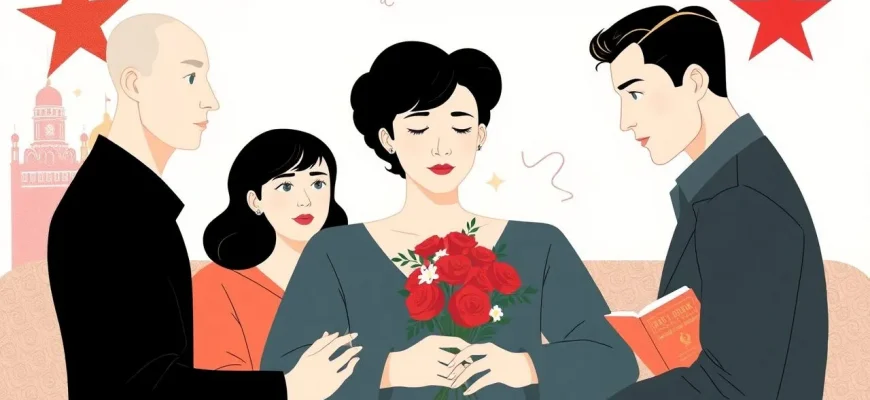Soviet cinema has always had a knack for weaving complex narratives around human emotions, and love triangles are no exception. These films delve into the intricacies of love, jealousy, and the human heart, offering a unique perspective on relationships through the lens of Soviet life. This collection not only entertains but also provides a cultural insight into the era's societal norms and values, making it a must-watch for anyone interested in the nuances of love and relationships in a different time and place.

The Irony of Fate (1976)
Description: This classic New Year's Eve comedy features a love triangle that unfolds when a man mistakenly ends up in another city and meets a woman who looks exactly like his fiancée. The film explores themes of fate, identity, and the unexpected turns of love.
Fact: It's a tradition in Russia to watch this film every New Year's Eve, and it has become a cultural phenomenon.
 30 Days Free
30 Days Free 
Moscow Does Not Believe in Tears (1980)
Description: This film follows the lives of three women over three decades, with one of them caught in a love triangle between her past love and a new suitor. It's a poignant look at love, ambition, and the passage of time.
Fact: The film won the Academy Award for Best Foreign Language Film in
 30 Days Free
30 Days Free 
The Cranes Are Flying (1957)
Description: Set during World War II, this film tells the story of a woman whose fiancé goes missing in action, leading her into a relationship with his cousin, creating a complex love triangle amidst the backdrop of war.
Fact: It was the first Soviet film to win the Palme d'Or at the Cannes Film Festival.
 30 Days Free
30 Days Free 
The Diamond Arm (1969)
Description: While primarily a comedy about a man mistaken for a smuggler, the film includes a subplot where the protagonist's wife suspects him of infidelity, creating a humorous love triangle.
Fact: The film is known for its iconic quotes and scenes, which have become part of Russian pop culture.
 30 Days Free
30 Days Free 
A Cruel Romance (1984)
Description: Based on a play by Alexander Ostrovsky, this film explores the love triangle between a wealthy merchant, his daughter, and her suitors, highlighting the societal pressures and personal desires of the time.
Fact: The film's soundtrack, featuring songs by Alexander Zatsepin, became very popular.
 30 Days Free
30 Days Free 
The Lady with the Dog (1960)
Description: This adaptation of Chekhov's story involves a love triangle where a man has an affair with a married woman, leading to emotional turmoil and introspection.
Fact: The film was praised for its fidelity to the original story and its nuanced portrayal of characters.
 30 Days Free
30 Days Free 
The Station Master (1972)
Description: Based on a Pushkin story, this film features a love triangle between a station master, his daughter, and a hussar officer, exploring themes of love, duty, and betrayal.
Fact: It's part of a series of adaptations of Pushkin's works by director Sergei Solovyov.
 30 Days Free
30 Days Free 
The Love of Mankind (1972)
Description: This film delves into the life of a doctor caught between his love for his wife and his patient, creating a poignant love triangle set against the backdrop of medical ethics.
Fact: The film was one of the first Soviet films to openly discuss medical ethics and personal relationships.
 30 Days Free
30 Days Free 
The Return of the Prodigal Son (1976)
Description: This film explores the dynamics of a family where the return of a prodigal son disrupts the existing relationships, including a love triangle between him, his brother, and their shared love interest.
Fact: The film was based on a play by Alexander Ostrovsky, known for his social dramas.
 30 Days Free
30 Days Free 
The Unfinished Piece for the Player Piano (1977)
Description: Set in a country estate, this film features a love triangle among the estate's inhabitants, exploring themes of love, art, and the passage of time.
Fact: The film was adapted from a play by Anton Chekhov, known for his nuanced character studies.
 30 Days Free
30 Days Free 








